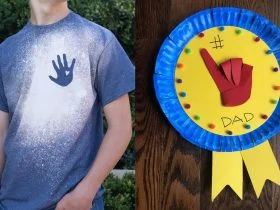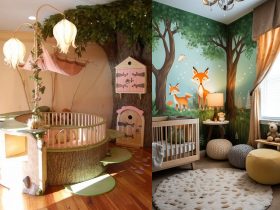New mothers can often fall into the trap of feeding frequently. For a breastfeeding mom, that might mean offering the boob every time the baby cries. It works, and it will calm down your baby. But it also carries risks. For example, giving too much food. How can you notice the signs of overfeeding breastfed baby?
You may worry that you are feeding your baby too much or too little. Today, we will talk about how to notice whether your baby has enough food.
Bringing a baby home for the first time is an exhilarating, nerve-wracking, and sleep-depriving experience. And in that mess, you might make a few small mistakes. We hope you avoid overfeeding your baby because that can pose risks to his health.
Reader's Roadmap
Can You Overfeed A Baby?
This might come as a surprise, but yes, you can overfeed a baby. Most infant nutrition experts agree that while it is uncommon, it is certainly possible.
You have to remember babies are capable of self-regulating their intake. They eat when they are hungry and stop when they are full. But it doesn’t mean that overfeeding doesn’t happen. Yes, it is rare, but it happens.
Breastfeeding babies are rarely at risk of overfeeding. When they reach fullness, they simply pull away or stop sucking. But it happens.
With baby formula feeding and bottle feeding, the risk is higher, because bottle-fed babies can be more prone to sucking even when they are full.
What Can Lead To Overfeeding?
Before we get to the signs of overfeeding breastfed baby, let’s talk about why does it happen. What can lead to overfeeding your little one? Here are some circumstances that might occur.
- Misreading baby’s cues, when parents misinterpret crying or waking as hunger cues and immediately offer food to their nursing baby. Yes, this is a way to soothe the newborn baby, but it can sometimes lead to overfeeding. Yes, crying and waking might indicate hunger, but it is not always the case
- Parents setting “normal” eating expectations. Some parents do not listen to what their babys pediatrician or doctor tells them, and they set their own expectations of what a baby needs to eat. They focus on hitting a particular target, say, 6 ounces per sitting. When you fixate on set nutrition goals, you may overlook the signs of satiation
- Parents can also set “normal” weight expectations, and when babies lag behind in the growth charts, parents encourage excessive feeding. They want their baby to catch up, despite being perfectly normal for some babies to put weight later on
- Difficulty with the bottle, this doesn’t apply to breastfeeding babies. But when babies drink from a bottle, they have less control over the amount of milk they consume in each gulp. Some parents also coax their baby into finishing the entire bottle, despite signs of hunger or fullness
How Do You Know Your Baby Is Full?
The good news for expecting parents and new parents is that it is not difficult to avoid overfeeding a baby. As long as you know what to look for, you will be fine. Do not rely on recommended nutrition targets and normal growth markers. Instead, build your feeding routine by paying attention to the cues your baby gives you.
Here are the signs your baby is full:
- Pushing the bottle or the breast away
- Turns its head away from the presented breast or bottle
- Spit out milk or infant formula milk and decline eating more
- Seems disinterested during feedings
- Extend and relax its fingers, arms, and legs
- Arch its back
- Decrease or stop sucking the breast
- Begin falling asleep
- Fuss or squirm
If you notice just a single of these signs of fullness, wrap it up. The feeding session is over and there is no need to push your baby to eat anymore. Do not try to finish the bottle, or present the breast again.
Pay attention to the fullness cues your child gives you.
How Much Milk Does A Newborn Need?
As we said before, you should not stick to certain goals or markers. But for info, there is a chart about how much milk a newborn baby needs.
According to research, exclusively breastfed babies take in an average of 25 oz (750ml) per day when they are between 1 and 6 months of age. But it doesn’t mean you need to hit that target. Instead, babies take 19 to 30oz per milk per day, which is 570ml to 900ml.
The scientific math formula says that you need to take your baby’s weight in pounds and multiply that number by 2.5. So, for example, if your baby weighs 9 pounds, x 2.5, that means 22.5 ounces of milk per day.
Signs You Have Overfed Your Baby
Now let’s talk about the question we asked in the beginning, what are the signs of overfeeding breastfed baby? Well, here are some signs to look for. If your baby displays any of these symptoms, it means you are constantly overfeeding it.
Spitting Continuously
Your baby will turn away from the bottle or breast during feeding, and then subsequently spits. It is a clear sign he/she is full. Yes, it is normal for babies to spit up. But if that happens frequently, it means your baby is overfed. And you need to lower the amount of milk it gets.
Vomiting
Yes, babies vomit. It is a common thing. But when your baby throws up more often than regular, it is a sign of overfeeding. And if vomiting continues without you changing something, it can lead to health problems in the long run.
Feeling Gassy And Bloated
You know that awful feeling when you feel your stomach may explode? Yes, bloating. Well, it is a common sign of an overfed baby as well. Overfeeding can cause bloating, cramps, feeling gassy, and even diarrhea.
Fussy And Irritated Baby
Here is a fun fact. Overfeeding your baby might make it cry constantly. And you offer the breast again, and it is a magic cycle. So, if you notice your baby is fussy and irritated, and constantly cries after eating, it means you are giving away too much of the goodies.
Burping
Yes, babies burp after feeding. But if they burp constantly all the time, it is a sign of overfeeding. So, tone it down a notch.
Sleeping Problems
Here is another thing you need to consider. If you overfeed your little one, you will cause sleep disturbance. Poor sleep habits will lead to an irritated baby, one that cries more than regular. And your baby will wake up often. So, check your baby’s eating portions.
Flatulence And Foul-smelling Stool
Flatulence and foul-smelling stools are often a sign of overfeeding your baby. We said overfeeding is rare, but it does happen.

Are There Any Dangers To Overfeeding?
As we said in the beginning, overfeeding your baby can lead to some health problems and issues. Here are the three most concerning.
Weight Gain And Obesity
Weight gain is not an indicator of overfeeding, but it is the outcome. Your baby might gain an abnormal amount of weight. This will double the chances of high blood pressure, obesity, and heart disease later in life
Gastroesophageal Reflux Disease
As we said before, one of the signs of overfeeding breastfed baby is gassiness and bloating. And if you do not react, it can lead to gastroesophageal reflux disease or GERD. If your baby has an acidity problem, it will worsen the condition.
Vomiting
Vomiting is both a sign and an outcome of overfeeding. Your baby might start vomiting after every meal. And chronic vomiting invites a series of problems in the long run.
Should You Use A Feeding Schedule?
In the beginning, babies should be fed on demand. They dictate feeding times. Yet, as your baby grows, it is natural to begin a feeding pattern. By 6 months of age, you should have a routine for food and breast milk. It becomes more important so that the weaning progresses and nutritional needs are met.
Do not worry, babies have the ability to let you know when they are hungry. But if you put in the effort, you can come up with a feeding routine that helps you and satisfies your baby’s needs for food.








Leave a Reply
View Comments